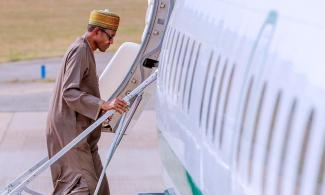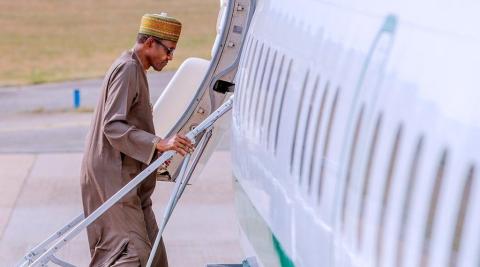
Despite promising to cut waste, the Buhari-led government has spent at least N41 billion on the presidential fleet.
Three Nigerian presidential jets were flown to Turkey by President Muhammadu Buhari and his entourage to the three-day Turkey-Africa Partnership Summit in Istanbul, SaharaReporters has gathered.
They include a Boeing Business jet (Boeing 737-700) marked 5N-FGT, a Falcon 7X jet with registration number 5N-FGV and a Gulfstream Aerospace GV-SP (G550) with registration number 5N-FGW and serial number 5310 (Mode-S 0640F2).

SaharaReporters gathered that the President travelled to Turkey on Thursday, December 16, using the Gulfstream Aerospace GV-SP (G550) marked 5N-FGW.
His advance team had left Nigeria at 05:02 pm on Wednesday, December 15, 2021, using the Falcon 7X jet with registration number 5N-FGV and arrived in Istanbul at 12:34 am (Turkish time) on Thursday, December 16.
The Boeing Business jet (Boeing 737-700) marked 5N-FGT which was taken to Germany for repairs in September was on Friday flown to Turkey. The aircraft touched down at the Ataturk International Airport in Istanbul at exactly 5:14 pm (Turkish time).
The presidential jet had developed a fault while the President and his entourage were returning to Abuja from the UN General Assembly in the US on Saturday, September 25.
The aircraft was subsequently moved to Euro Airport in Germany on September 29 and arrived at 4.15 pm after leaving the Nnamdi Azikiwe International Airport at 9.48 am, with the Nigerian government paying €5,000 (Euros) per night as parking fee. [story_link align="left"]102542[/story_link]
To avoid any backlash, SaharaReporters gathered that the registration of the 5N-FGT aircraft was done using AMACGND.
On Sunday, President Buhari returned to Nigeria from Turkey using the aircraft.
“President Muhammadu Buhari is back in Abuja after attending the three-day Turkey-Africa Partnership Summit in Istanbul.
“The official BBJ aircraft which he hadn’t used for several months as it underwent repairs and improvements landed at the Nnamdi Azikiwe International Airport at exactly 2:35,” Senior Special Assistant to the President on Media and Publicity, Garba Shehu, on Sunday posted on Facebook.
While the Gulfstream Aerospace GV-SP (G550) marked 5N-FGW returned to Nigeria on December 17, the Falcon 7X jet with registration number 5N-FGV got back to the country on Sunday, December 19 after a stopover in London.
Despite promising to cut waste, the Buhari-led government has spent at least N41 billion on the presidential fleet.
After taking office on May 29, 2015, the 2016 Appropriation Act signed by the President allocated N3.652 billion for the upkeep of the presidential fleet.
In 2017, the cost of maintenance of the presidential aircraft rose to N4.37 billion (19.6 per cent). The figure then skyrocketed to N7.260 billion (98.7 per cent) in 2018.
In 2019, the cost of maintaining the PAF again rose to N7.297 billion (99.6 per cent). The allocation, however, fell to N6.793 billion (86 per cent) in 2020. But in 2021, the budget for the presidential fleet saw its sharpest Buhari-era jump to N12.550 billion (243.6 per cent).
By comparison, the 2015 budget, which was in effect upon Buhari’s inauguration, earmarked N5.190 billion for the presidential fleet. The appropriation for the Presidential Air Fleet in 2021 indicates a 243.6 per cent increase from the allocation six years prior.
Meanwhile, the Nigerian government is broke and has been relying on borrowing to run its affairs.
For instance, the Minister of Labour and Employment, Mr Chris Ngige, had in September 2021 confirmed that the Nigerian government under President Muhammadu Buhari borrowed funds from international sources to pay salaries of workers because of a shortfall in the country’s revenue.
Ngige had said the government took borrowed funds from foreign institutions like the World Bank to offset some recurrent expenditures.
Also, the Minister of Finance, Budget and National Planning, Zainab Ahmed, had in April 2021 admitted that Nigeria’s economy was facing a difficult time, saying borrowing was inevitable.
She had said, “We have very low revenues, we have very high expenditures. What we have done so far is just to provide some stability to make sure salaries are paid, pensions are received every month; that we send funds to the judiciary and the legislature; that we meet our debt service obligations.
“That’s what we are doing. It also means we have had to borrow more than we had planned before the COVID-19 started because we need to still continue to invest in infrastructure using our national budget. We borrowed to invest in key projects such as roads, rail, airports, seaports and several other investments that are required in health and in education and upgrading the social standards and quality of life of our people and Nigeria is not unique as several countries of the world went into recession.
“Almost every other country has had to borrow more than it planned. It means we expanded our deficit very fast in 2020. 2021 is a year that we see as the year of recovery.”
“So, FAAC reduces and whenever FAAC reduces, it is a very difficult situation and in the past one year, we have tried to fall back on some specific accounts that are meant to be saved; savings that when you have such a situation, you fall back on the resources and augment.
“So, we take funds based on Mr President’s approval either from Excess Crude or Stabilisation Account or in some cases, President approved for us to take funds from LNG (Liquefied Natural Gas) dividends. In the month of March, we had a shortfall of FAAC that was about N50 billion; we didn’t have enough accrued in any of those accounts other than some N8.5 billion that we took from the exchange rate differential account so we added that and we ended up with the FAAC of N605 billion.”
Nigeria’s dwindling finances had also come under intense pressure as the Muhammadu Buhari-led government as it had been amassing foreign loans.
The country’s debt profile according to the Debt Management Office was N33.10trillion as of the end of the first quarter of 2021.
This represents an increase of N191bn compared to the N32.91 trillion recorded in December 2020.
The DMO in a statement had said the debt figures include the debt stock of the federal and state governments, as well as the Federal Capital Territory.